Song of the Week: “Dinner With Friends,” by Kacey Musgraves - “The way that the sun on my floor makes a pattern of light”
It has been, by most measures, an extremely weird couple of weeks for me.
Around two months ago, after a full year of applying to jobs in the Kitchener area with absolutely no luck, Taylor made the difficult decision to try applying for positions in the Detroit area. Within a month, he had a job offer, doing something he loves and can learn from with good benefits and a great salary. After a year of scrimping and saving, of resentment and depression, he would have direction and career satisfaction again, and I would be freed from the terrible burden of carrying our financial survival on my shoulders.
It was wonderful news, and an incredible relief, and also very, very hard.
Because we expect my green card application to be processing for at least the rest of this year, and I have no intention to leave behind my excellent job, friends and family, or cozy apartment in the meantime, the new job meant that Taylor would be moving to Michigan alone, and driving back to see me and our cat Minnie every weekend.1
Last week, after an exhausting series of delays and misadventures that I’ll tell you about some other time, we successfully got the keys to Taylor’s modest one-bedroom apartment and stocked it with kitchen essentials and IKEA furniture. His single mattress looked lonely in the corner of the bedroom, and his carefully folded clothes barely took up any space in the walk-in closet. After a few days back in Canada (he was scheduled to start the new job after Memorial Day), we said goodbye on Sunday morning, and then, right before he drove away, we finally began to cry.
And now, for the first time in almost seven years, I have to figure out how to live alone again.
Note Things That You See
When looking for inspiration on how to live a full and content life alone, I thought immediately of the quirky and immensely lovable Hermux Tantamoq, from Michael’s Hoeye’s criminally underrated Time series.2
Hermux Tantamoq is a watchmaker who loves trying interesting new food, wearing boldly colorful clothes, and occasionally solving mysteries. He is also a mouse.
Hermux lives in a world of anthropomorphized birds and small mammals with wonderful names and the kind of professions you would see in a Richard Scarry book. He has a pet ladybug named Terfle.
At the beginning of the first book, Time Stops for No Mouse, Hermux is having tea with his friend Mirrin, an artist who recently went blind. When he confesses to her that he does not think he has a very well-developed sense of beauty, she gifts him a small sketchbook, and encourages him to write down things he notices and then report back to her. “I want you to note things that you see,” Mirrin says, “Like the primroses. You’ll be my eyes in the outside world. And you’ll read to me about what you’ve seen. And you will develop your sense of beauty by paying attention to the world around you” (39).
So Hermux takes the sketchbook home, and - after a few failed attempts to write elegant prose following a visit to the opera - his record of beauty becomes a journal full of gratitude for ordinary things: “Thank you for friendship most of all. Thank you for cuff links. And for singing larks dressed up like carnival moths. Thank you for dark theaters….Thank you for Terfle. For cotton sheets and and soft pillows and apple juice. And cheese.” (58)
Throughout the series, amidst his late night investigations, journeys to distant lands, and a romance with the free-spirited adventurer Linka Perflinger, Hermux continues to pause and take note of his gratitude for the simple and profound pleasures that surround him: for “elevators and trolleys,” “apple orchards and foggy drives” and for “a safe place to lay my head at night.”
As I revisited Hermux’s lists, I realized that despite a week that felt strange and hard and lonely, I was overwhelmed with gratitude:
For the friends and coworkers and family members who had called or texted or paused in the hallway to check in with me, and ask about Taylor’s first day of work (it was great!), and see whether I needed anything. For shared drinks and meals and shopping trips.
For the walkable streets and decent public transit in my city, that allows me freedom of movement and the ability to run errands and try new restaurants and visit with friends without a car.
For chatty podcasts in my wireless earbuds, and The Vicar of Dibley on DVD from the library, and the incredible improvements in video streaming technology allowing Taylor and I to keep each other company late in the evenings while we do dishes and wrap up little projects and brush our teeth and climb into bed.
And for all of the other ordinary and enduring wonders of a beautiful week at the end of May, surprisingly not diminished despite my solitary role in witnessing them: iced coffee and burrata, the silky warmth of the fur on Minnie’s belly as she lolls sun-drunk by the window, the gently dancing shadows of the light shining through fresh new leaves and undulating on a stone wall.
And oh, for the flowers, ubiquitous and overwhelming in their delights: the clover and my now-beloved dandelions, the strange-painted irises and tissue-paper peonies, and the hundreds more appearing everywhere overnight, their names unknown to me and yet no less lovely.
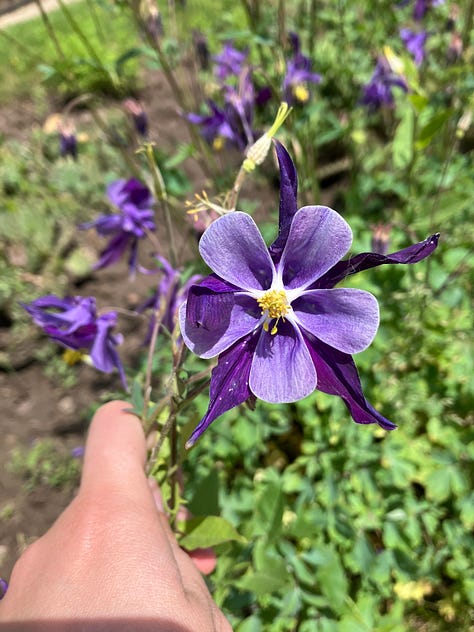

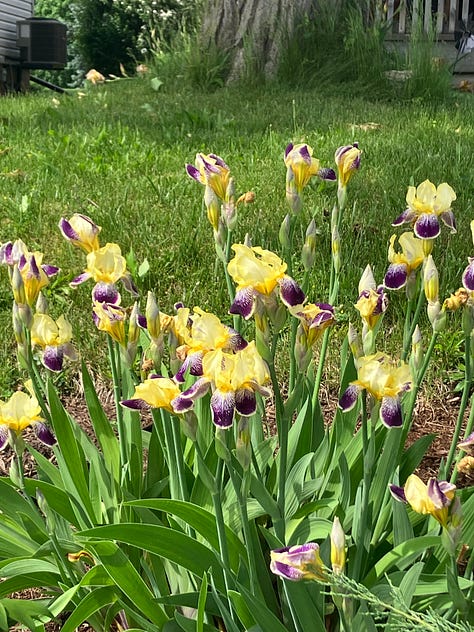
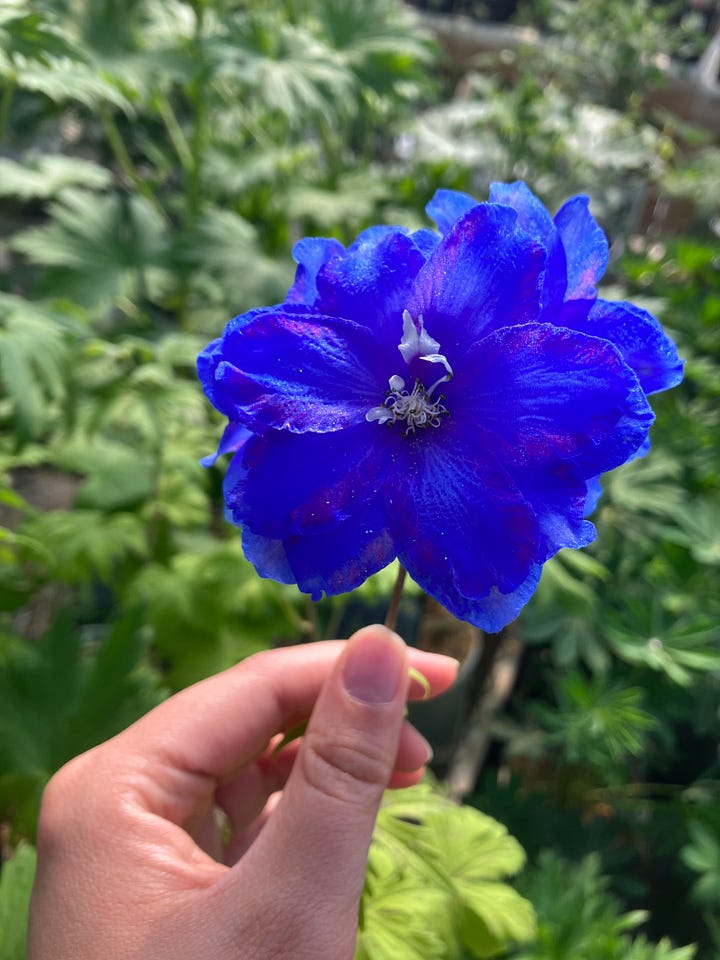
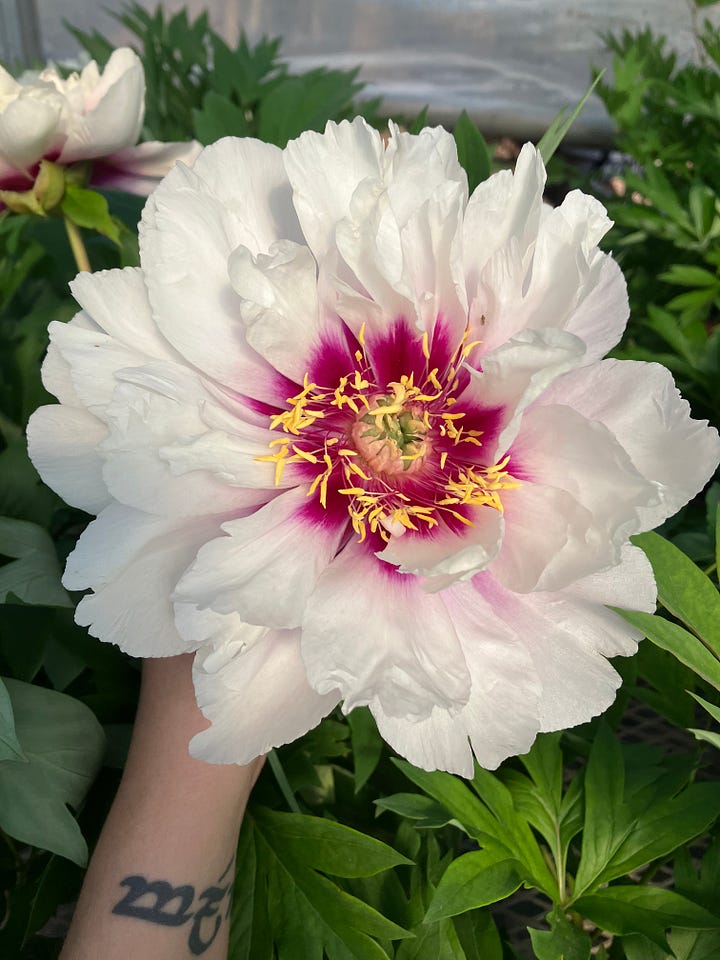
I just found out that my coworker and I have been granted a free garden plot for the summer as part of a community garden pilot our university is running, so on Wednesday evening Jillian and I visited a local plant nursery so I could buy seeds and tiny aromatic tomato plants with names like “Sunrise Bumblebee” and “Early Girl.”
The sun was shining, and the breeze was warm, and everywhere I looked my vision was filled with a riot of colors and textures and shapes, and I was overwhelmed with the goodness of it, with the luck. How wonderful to be in a world with flowers.
This Fresh Morning in the Broken World
It feels obvious to the point of cliché to tell you that flowers are beautiful, that my comfortable and privileged life has remained comfortable and privileged, that I am thankful for the love of my friends.
It also feels naive at best, and callous at worst.
I feel guilty, because even the things we are sacrificing are sacrifices towards - towards our upcoming move, towards our future, towards our children. Because we have the stability and safety to be able to dream those dreams.
In a world so constantly connected to every place and every horror, my joys feel crass, my griefs petty.
What right do I have to cry over weekly separation for a job when babies are starving to death and families’ dreams are turned to ashes and rubble? What solace are tomato vines in the face of rising prices, rising fascism, rising seas?
I worry, even as I write this, that writing about gratitude is absurd in a world that also contains such horrors, such flagrant disregard for human life, so much greed rebranded as a blessing or a birthright.
I am not advocating for toxic positivity. This essay does not stem from an insistence on only acknowledging pleasant things, nor from any misguided belief that looking for silver linings or counting your blessings can fix systemic inequalities or cycles of violence. That kind of thanks rings hollow.
And yet. Surely the solution is not to feel guilty for enjoying the laughter of friends over simple food, a cat purring in the sun, or safe and welcoming public spaces, but rather to see these treasures for what they are: things not to be hoarded but to be shared as widely as we can.
If we are to learn and move and fight and work, must we not also have nourishment?
I look, as I so often do, to Mary Oliver, who articulates the paradox of gratitude in a fragile and bleeding world so wonderfully:
Invitation
Oh do you have time
to linger
for just a little while
out of your busy
and very important day
for the goldfinches
that have gathered
in a field of thistles
for a musical battle,
to see who can sing
the highest note,
or the lowest,
or the most expressive of mirth,
or the most tender?
Their strong, blunt beaks
drink the air
as they strive
melodiously
not for your sake
and not for mine
and not for the sake of winning
but for sheer delight and gratitude—
believe us, they say,
it is a serious thing
just to be alive
on this fresh morning
in the broken world.
I beg of you,
do not walk by
without pausing
to attend to this
rather ridiculous performance.
It could mean something.
It could mean everything.
It could be what Rilke meant, when he wrote:
You must change your life.
So Much Is Perfect
Somehow, incredibly, today marks fifteen weeks of Syllabus: fifteen weeks of assembling stacks of books from my home and public library, going on internet deep dives, and staying up till 1 am on Thursday night despite promising myself that this week will be different. It has been one of the hardest and most rewarding projects of my life thus far.
As you may have intuited by now, one of the major inspirations for this project was John Green’s podcast-turned-memoir The Anthropocene Reviewed.
In The Anthropocene Reviewed, Green reviews “different facets of the human-centered planet on a five star scale.” In the episode “Capacity for Wonder and Sunsets,” Green dabbles in the clichéd, the overly-clever, and the cynical before turning, as he always does, to sincerity. After describing a memory of his dog running through the yard at dusk before flopping down, belly-up, open and eager for affection, Green reflects:
It’s hard to trust the world like that, to show it your belly.
I don’t know exactly how to describe this, but there’s something deep within me, something intensely fragile, that is terrified of turning itself to the world. Maybe it feels like loving the beauty that surrounds us somehow disrespects the many horrors that also surround us. Or maybe I’m just scared that if I show the world my belly, it will devour me. And so I wear the armor of cynicism, and hide behind the great walls of irony, and only glimpse beauty with my back turned to it…
But I want to be earnest, even if it’s embarrassing. The photographer Alec Soth has said, “To me, the most beautiful thing is vulnerability,” and I would go a step further and argue that you cannot see the “beauty which is enough” unless you make yourself vulnerable to it.3
And so I try to turn toward that scattered light, belly out, and I tell myself: This doesn’t look like a picture. And it doesn’t look like a God. It is a sunset, and it is wildly beautiful, and this whole thing you’ve been doing where almost nothing gets five stars because almost nothing is perfect? That’s b.s. So much is perfect. Starting with this.
I give sunsets five stars.
It is so scary, this vulnerability. Every week, I second-guess whether I have anything worth saying, whether this will be the week when it all falls apart, whether anyone is listening. And every week, right when I’m at my lowest, someone reaches out: with a recipe for dandelion tea, or an essay about good parties, or a memory from childhood, or just a few words of appreciation and empathy.
So here, in a beautiful and terrible week, is my final gratitude: I am so grateful for you.
When it comes to gratitude, what should I add to my syllabus?
I want to hear from you, whether it’s in the comments on this post or in emails to me directly at roschmansyllabus@substack.com!
As many of you have heard already, we are in the process of moving back to the United States, hopefully to our beloved Colorado. I’ll talk about that decision more in the future.
The four books in the series are Time Stops for No Mouse (1999), The Sands of Time (2001), No Time Like Show Time (2004), and Time to Smell the Roses (2007). My dad read them aloud to me as a kid, and to this day I have never met anyone else who has even heard of them.
Green is referencing a line he quoted earlier from Toni Morrison’s Tar Baby (1981): “At some point in life the world’s beauty becomes enough. You don’t need to photograph, paint or even remember it. It is enough. No record of it needs to be kept and you don’t need someone to share it with or tell it to. When that happens - that letting go - you let go because you can.”







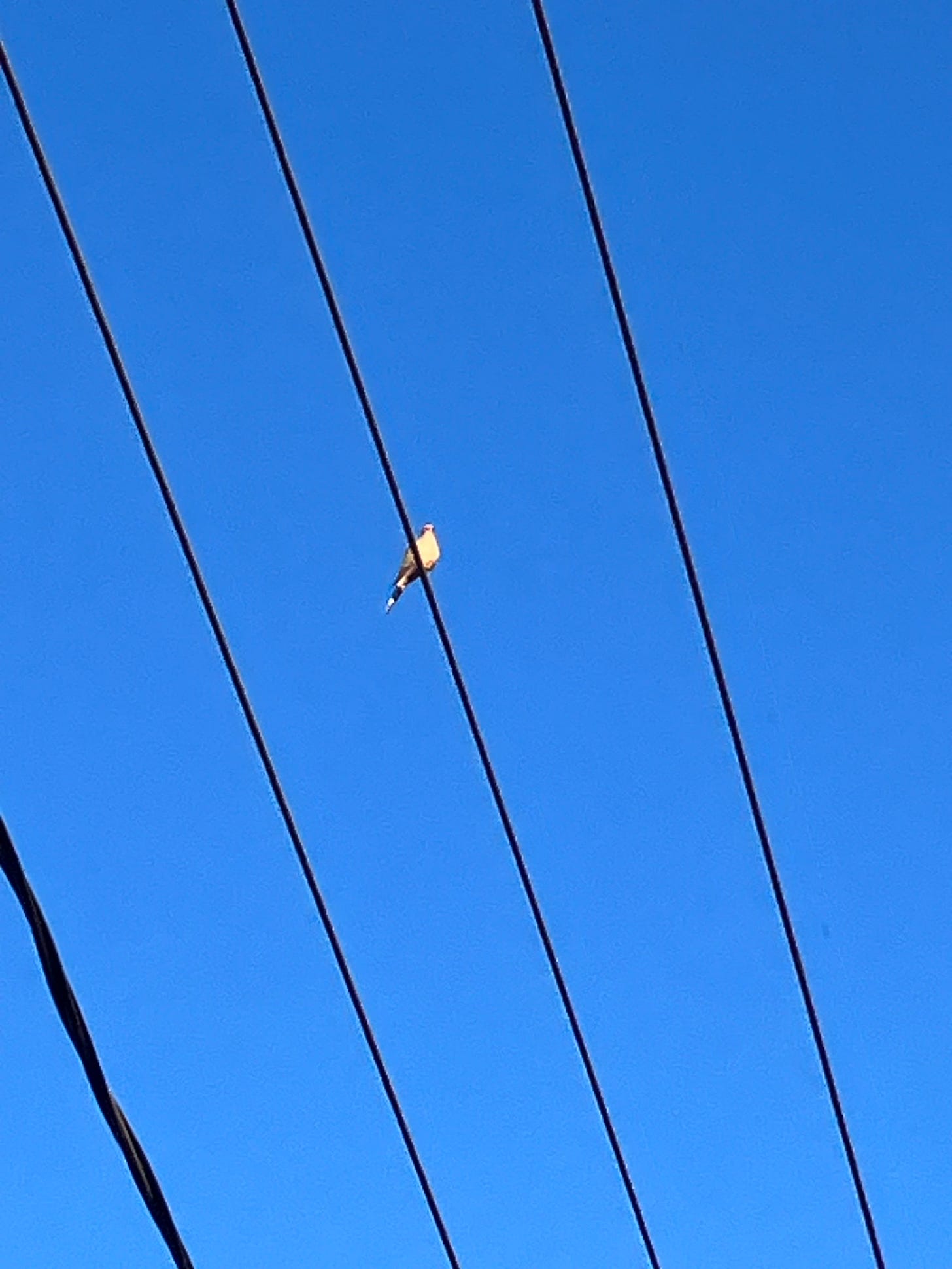
My favorite so far! Just wonderful. Big hug and thank you for reminding us that gratitude is never wasted. Praying your green card process is on the fast track.